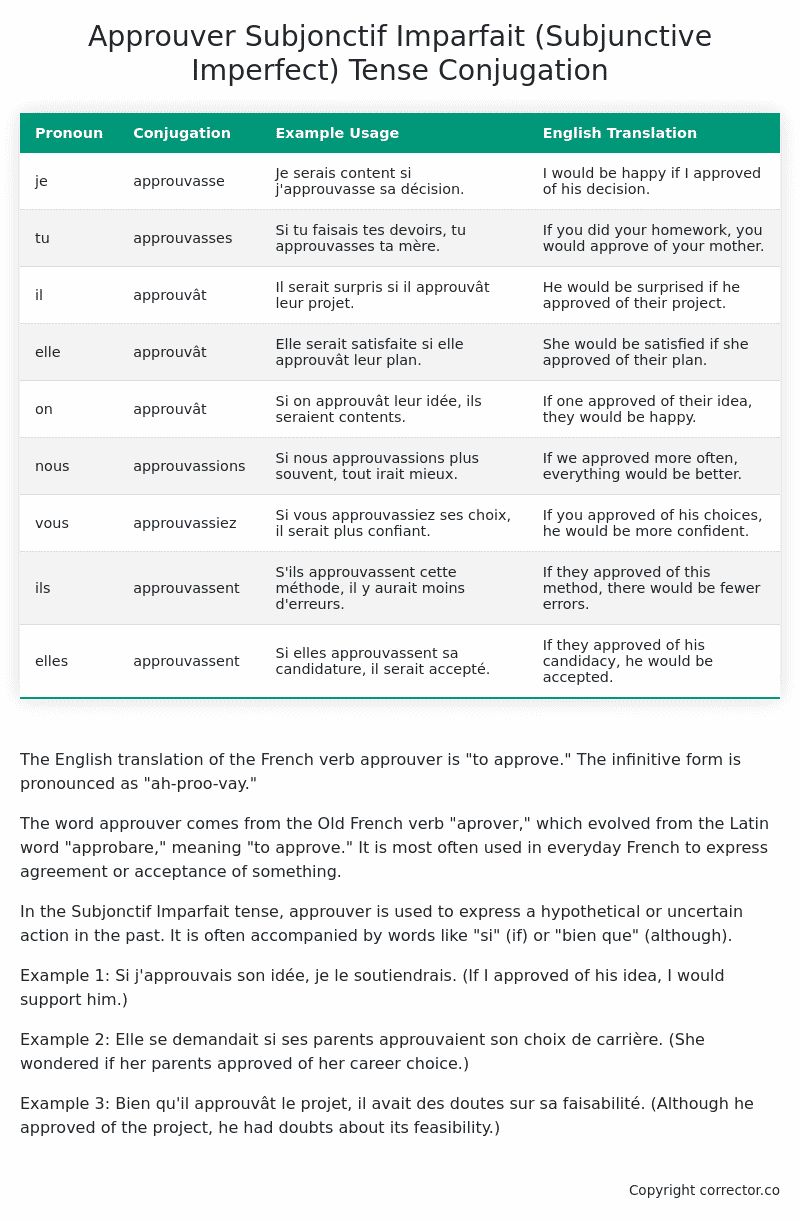Subjonctif Imparfait (Subjunctive Imperfect) Tense Conjugation of the French Verb approuver
Introduction to the verb approuver
The English translation of the French verb approuver is “to approve.” The infinitive form is pronounced as “ah-proo-vay.”
The word approuver comes from the Old French verb “aprover,” which evolved from the Latin word “approbare,” meaning “to approve.” It is most often used in everyday French to express agreement or acceptance of something.
In the Subjonctif Imparfait tense, approuver is used to express a hypothetical or uncertain action in the past. It is often accompanied by words like “si” (if) or “bien que” (although).
Example 1: Si j’approuvais son idée, je le soutiendrais. (If I approved of his idea, I would support him.)
Example 2: Elle se demandait si ses parents approuvaient son choix de carrière. (She wondered if her parents approved of her career choice.)
Example 3: Bien qu’il approuvât le projet, il avait des doutes sur sa faisabilité. (Although he approved of the project, he had doubts about its feasibility.)
Table of the Subjonctif Imparfait (Subjunctive Imperfect) Tense Conjugation of approuver
| Pronoun | Conjugation | Example Usage | English Translation |
|---|---|---|---|
| je | approuvasse | Je serais content si j’approuvasse sa décision. | I would be happy if I approved of his decision. |
| tu | approuvasses | Si tu faisais tes devoirs, tu approuvasses ta mère. | If you did your homework, you would approve of your mother. |
| il | approuvât | Il serait surpris si il approuvât leur projet. | He would be surprised if he approved of their project. |
| elle | approuvât | Elle serait satisfaite si elle approuvât leur plan. | She would be satisfied if she approved of their plan. |
| on | approuvât | Si on approuvât leur idée, ils seraient contents. | If one approved of their idea, they would be happy. |
| nous | approuvassions | Si nous approuvassions plus souvent, tout irait mieux. | If we approved more often, everything would be better. |
| vous | approuvassiez | Si vous approuvassiez ses choix, il serait plus confiant. | If you approved of his choices, he would be more confident. |
| ils | approuvassent | S’ils approuvassent cette méthode, il y aurait moins d’erreurs. | If they approved of this method, there would be fewer errors. |
| elles | approuvassent | Si elles approuvassent sa candidature, il serait accepté. | If they approved of his candidacy, he would be accepted. |
Other Conjugations for Approuver.
Le Present (Present Tense) Conjugation of the French Verb approuver
Imparfait (Imperfect) Tense Conjugation of the French Verb approuver
Passé Simple (Simple Past) Tense Conjugation of the French Verb approuver
Passé Composé (Present Perfect) Tense Conjugation of the French Verb approuver
Futur Simple (Simple Future) Tense Conjugation of the French Verb approuver
Futur Proche (Near Future) Tense Conjugation of the French Verb approuver
Plus-que-parfait (Pluperfect) Tense Conjugation of the French Verb approuver
Passé Antérieur (Past Anterior) Tense Conjugation of the French Verb approuver
Futur Antérieur (Future Anterior) Tense Conjugation of the French Verb approuver
Subjonctif Présent (Subjunctive Present) Tense Conjugation of the French Verb approuver
Subjonctif Passé (Subjunctive Past) Tense Conjugation of the French Verb approuver
Subjonctif Imparfait (Subjunctive Imperfect) Tense Conjugation of the French Verb approuver (this article)
Subjonctif Plus-que-parfait (Subjunctive Pluperfect) Tense Conjugation of the French Verb approuver
Conditionnel Présent (Conditional Present) Tense Conjugation of the French Verb approuver
Conditionnel Passé (Conditional Past) Tense Conjugation of the French Verb approuver
L’impératif Présent (Imperative Present) Tense Conjugation of the French Verb approuver
L’infinitif Présent (Infinitive Present) Tense Conjugation of the French Verb approuver
Struggling with French verbs or the language in general? Why not use our free French Grammar Checker – no registration required!
Get a FREE Download Study Sheet of this Conjugation 🔥
Simply right click the image below, click “save image” and get your free reference for the approuver Subjonctif Imparfait tense conjugation!

Approuver – About the French Subjonctif Imparfait (Subjunctive Imperfect) Tense
Formation
Common Everyday Usage Patterns
Interactions with Other Tenses
Subjonctif Présent
Indicatif Passé Composé
Conditional
Conditional Perfect
Summary
I hope you enjoyed this article on the verb approuver. Still in a learning mood? Check out another TOTALLY random French verb conjugation!


